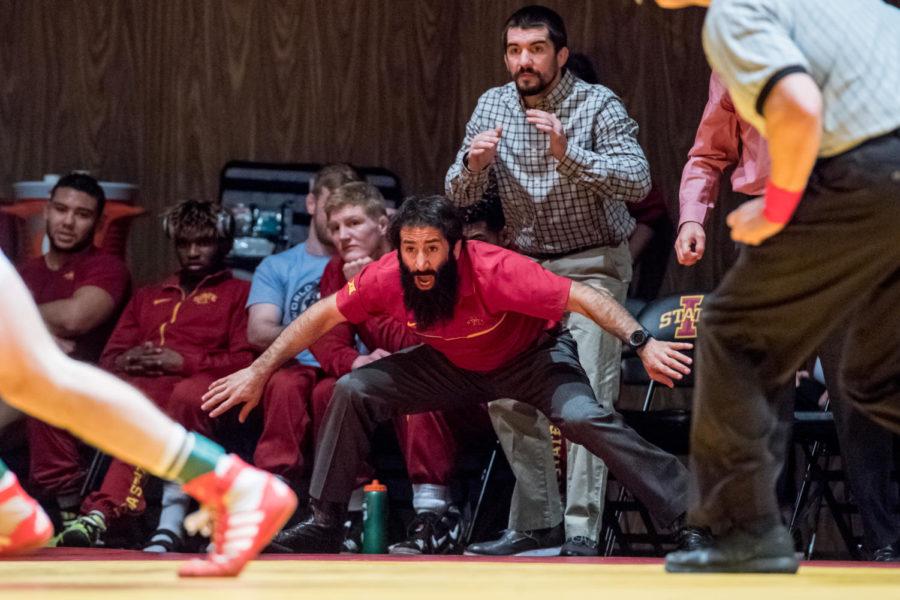‘This ain’t a Cinderella Story’: Mike Zadick’s journey to the 2008 Beijing Olympics
February 7, 2018
As other kids dreamt of being firefighters or hitting a walk off home run in Game 7 of the World Series, Iowa State wrestling’s associate head coach Mike Zadick wanted to be an Olympic champion.
“I knew when I was five years old,” Zadick said.
Wrestling wasn’t the only sport that Zadick enjoyed as a kid; football was another sport the young Zadick pursued.
Zadick held Pro Football Hall of Famer Barry Sanders in high regard because Sanders was relatively short — at 5-foot-8 — compared to most NFL players. Zadick’s father was only 5-foot-6, so the prospect of being a similar height to Sanders seemed reasonable for Zadick at the time.
Despite his love for football, the infatuation for the sport did not last.
“I always enjoyed it until my freshman — sophomore year really — of high school, then reality kicked in,” Zadick said, “I was singly motivated to become great at wrestling and rodeo.”
Like football, Zadick’s rodeo career didn’t outlive his wrestling one.
Zadick’s friends in Montana were involved in the rodeo and Zadick would practice riding broncos and bulls. It was there that Zadick realized that pursuing rodeo would put his wrestling dreams at stake.
“You are just going to get hurt eventually,” Zadick said. “It’s just a matter of time.”
Wrestling in high school from 1994 to 1997, Zadick was a four-time Montana State Champion; the last three of those seasons were undefeated campaigns.
At the University of Iowa, Zadick was a three time All-American. He finished seventh in 2000, third in 2001 and seventh in 2002.
With the conclusion of his collegiate career, Zadick attempted to qualify at 60-kilograms for the 2004 Olympic Games in Athens, Greece.
At the trials, Zadick defeated the previous alternate and faced Eric Guerrero in the finals with a chance to wrestle in Athens for the United States. Zadick lost to Guerrero 5-2, making Zadick the alternate in Athens and Guerrero the starter.
“I was that close, but not good enough,” Zadick said.
Being “not good enough” was the hardest part of the experience for Zadick. He believed Guerrero was beatable, and while Zadick felt he could win any match, he didn’t think other people thought the same.
“After that was kind of a springboard forward, saying ‘you are right there, and the next four years you are going to be there and you get back to work,’” Zadick said.
The following year in 2005, Zadick was unable to try out for the World Team after breaking his sternum. Then in 2006, Zadick made it on the World Team as a starter and got second at the FILA Wrestling World Championships with a highlight win over two-time Olympic Gold Medalist Mavlet Batirov from Russia.
“Knowing I was second in the world at that time…. I’m not worried about making it in the U.S,.” Zadick said. “I’m one notch away, a scramble, or one point away in a match and I’m a world champ.”
The expectations were raised.
The following year Zadick failed to place at the World Championships, but won a silver medal at the Pan-American Games.
Entering the 2008 Olympic trials, Guerrero had retired, leaving Zadick as the incumbent to fight off any challengers for the top spot at 60-kilograms. Zadick won first place at the Olympic trials, but there was a complication.
No wrestler from the United States finished high enough at 60-kilograms in international competition to qualify for the Olympics.
There would be 244 wrestlers competing at the Beijing Olympics, but Zadick would not be one of them.
The only chance Zadick had would be if both the starter and alternate at 60-kilograms were unable to compete from another country — and Zadick would have to be named the alternate over numerous other wrestlers.
In an extremely unlikely event, two wrestlers from Bulgaria were unable to compete at the Olympics. The starter was injured, and the alternate was involved in a car accident on the way to the airport two days before wrestling began.
There was still a chance he wouldn’t get the call even though Zadick was a World Silver Medalist and had knocked off Batirov, but those credentials boosted Zadick to his first Olympics.
Zadick had stayed prepared, but his preparation wasn’t suitable for Olympic competition.
“It’s hard to think it’s really going to happen that close, two days out, but it ended up happening,” Zadick said.
Zadick’s weight was not in check and he was forced to cut a large quantity of weight in two days.
“The experience where this ‘ain’t a Cinderella Story’ is, did I make it fair and square? Yeah. Did I get to wrestle in the Olympics? Yeah,” Zadick said. “When I made weight I couldn’t keep anything in my body the whole night.
“When I woke up the next day for my warm up to step on the mat I remember walking out of the tunnel and I could hardly step, I could hardly walk. I knew it. I was going to get smoked.”
Zadick believed that no matter what his condition he had to give it his best shot.
He lost both his matches 3-0.
For Zadick, it’s often the losses and tough times in wrestling that are the most memorable, rather than the wins, because they can have the most profound impact. Experiencing something like Beijing was comparable to losing a loved one, because wrestling was Zadick’s life.
“At the end of the day, I never was motivated throughout my life to grow up and say I went to the Olympics,” Zadick said. “I wanted to go win them.”
















